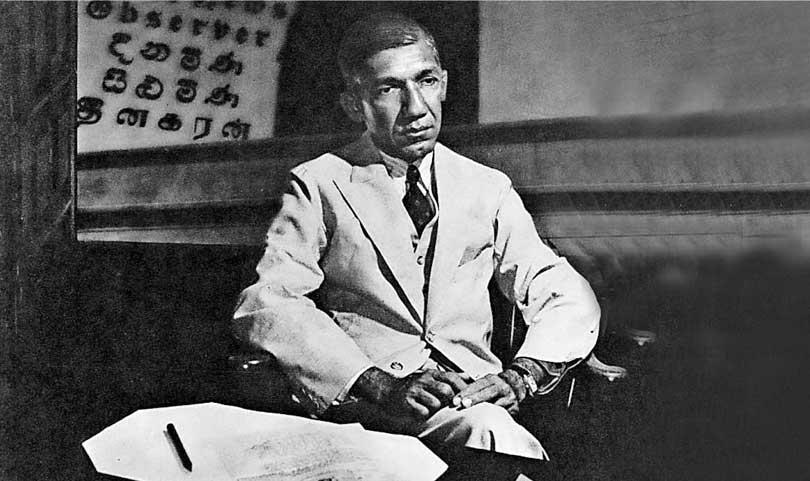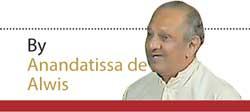Reply To:
Name - Reply Comment
Last Updated : 2024-04-20 11:24:00

 I consider this an opportunity to pay sincerest respect to someone whom I owe possibly my entire existence and in my case it was D.R. Wijewardene.
I consider this an opportunity to pay sincerest respect to someone whom I owe possibly my entire existence and in my case it was D.R. Wijewardene.
There are many of us to whom it was a privilege to work in an institution which is part of the history of this country. It has truly been said by somebody that it is not the mastery of language that makes a book, but the mind and the man behind it.
It is true that the Associated Newspapers of Ceylon Ltd, was known to be always ahead of others in the introduction of technical excellence in the production of its newspapers and in the introduction of business management of a newspaper’s enterprise.
But these voluble as they were were not the main propelling power and force behind the institution that we have come to known as Lake House. That great power was a mind; the mind of D.R. Wijewardene.
I remember when he published a supplement in the Daily News to commemorate the occasion of the opening of the extension of the new Lake House building in the ‘30s. He said in an article he wrote under his name, which was very rarely: “I did not start a newspaper enterprise to bring home great argosies. There are many other fields in which fortunes can be made faster than in the newspaper industry”.
And in saying that he continued to explain why he began these newspapers.
He began these newspapers because he was motivated by the same powers and forces that propelled our best people of that time - people like F.R. Senanayake, D.S. Senanayake, Sir Baron Jayatilaka, people of that rank, a standing force in this country.
They were the men who worked in the fields, they were the men who worked among the people. D.R. Wijewardene was a man who worked among the minds. While the Senanayakes, the Jayatilakas and other leaders went about the country from temple to temple, meeting to meeting, talking about the worth and value of freedom, the worth and value of self government and of one day ruling ourselves and being free of British domination, Mr. Wijewardene from his room in Lake House, told the people every day what all this talk was about.
In so doing, he gathered around him men of great eminence and patriotic endeavour. Men like E.W. Perera, I remember, took hours of Mr. Wijewardene’s time talking ardently, seriously, furiously, angrily - discussing the events of that time. Other people of that same calibre including C.L. Wickremesinghe, father of Esmond, his friends and many others like D.S. Senanayake met in his bungalow, surrounded themselves with opinions from the four corners of the island and planned out a campaign to win the favour of the Colonial Office, so that it could grant greater and greater measures of self-government for the colony called Ceylon.
D.R. Wijewardene at the same time attracted severe criticism. There never was a meeting held at the Galle Face Green at that time by the Marxist elements of this country in which what they called the ‘Beira-gedera’ newspapers, were most strongly and severely attacked. Sometimes, copies of the newspapers were burned on the platforms.
If you will turn back the pages of those days and re-live the campaigns the Lake House newspapers ran, the astounding pioneering thought to which Lake House can very pleasurably bear credit will be apparent.
The university argument, for example, was not merely whether the location should be Colombo or Peradeniya (his choice was not so important) but the greater concept that Mr. Wijewardene began to push forward. It was that Sri Lanka was ready for its own university, and that the university should have its own life and thought and being and personality.
The ethos of a nation
If you will turn back the pages you will find that the leaders upheld that they must not be copies of Oxford and Cambridge and London. That the ethos of a nation must create its own educational structures. Numerous articles were published at that time particularly in the Sinhala papers of the organisation where it was pointed, but that the ancient pirivena systems of Asia were forerunners of the universities of western lands.
Mr. Wijewardene also campaigned for freedom for women, recognition of their right not merely to courtesy, not merely to elegant manners or etiquette of the West, but to the freedom that was propounded by the Thathagatha the Buddha himself, the first liberator of women from being second to man and the vassal of man.
Here again to find this philosophy you have to dip into the pages of the Silumina and the Dinamina of that time.
I must tell you that Sir John Kotelawela, whose private secretary I was for some time, told me that there was a discussion at the very highest level after Sri Lanka had a prime minister and a parliament, that the highest possible honour that the Queen or Royalty in England could confer, should be accorded to Mr. D.R. Wijewardene. There was a discussion that mere knighthoods, KCMGs, CMGs and things like that would not do for this man.
They proposed that Whitehall should recommend and approve a baronetcy for him. But it was not the practice in those days in Whitehall to get accustomed to the possibility that a baronetcy might well be conferred on people outside the British Isles.
But that was the level of the respect and honour in which he lived and worked and died. There was nothing in the social, educational and political life of this country to which his mind did not contribute through his newspapers. Nothing he did not contribute in the promotion of the arts, the construction of the Art Gallery, the Society of Arts, the far ranging field of colonisation in Minneriya - (the pioneer of which was Mr. D.S. Senanayake), the concepts of agricultural development and so many other fields of human life, every single one of which interested him, a student of which he was of great diligence. He had an array of eloquent, capable, writers to present his views to the nation and people.
He could be a very tough employer. I knew a colleague of mine who once told me “I have been re-employed for the eleventh time”. He was, I remember, re-called ten times in the time I knew him, but while he demanded excellence, diligence, dedication to work, (without which those achievements would not have been possible), he also had the soft, kind, heart of a noble and good man.
His efforts to set up at the Peradeniya University a Sangharamaya shows the vision he had of the educated Sangha of the future who would have an academic background second to none. That would be the background that would make a bhikku stand out anywhere else in the world outside Sri Lanka and speak the many tongues in which Buddhism should be promulgated all over the world.
That was the vision he had at that time. He not only urged it, he not only wrote about it, he left large bequests to make it come true.
So we are using the name of Mr. D.R. Wijewardene for a tremendous and noble enterprise; the name to be given to the finest Sinhala novel this year. Modern Sinhala journalism, modern Sinhala writing, had a great leap forward in the time of D.R. Wijewardene.
The Dinamina and the Silumina were the equal and sometimes the specimen of national language newspapers in the whole of Asia, and here 1 refer to India, Pakistan and Burma; all of which at that time were part of the British Commonwealth of Nations - or British Empire if you like to call it - publishing newspapers in many, many languages.
The Dinamina and the Silumina were not only technically ahead of that time, but they were ahead in content. The traditional style of Sinhala journalism up to that time was interminable debates around a chosen few on some obtuse grammatical point.
Issue after issue, week after week, hundreds debated in the newspaper columns of that time on whether the letter k was better and correct or should it rather be the letter { These were rewarding and graceful exercises of scholarship, but they let the language die, gasping for life.
The Dinamina and the Silumina ignored all this and gave the people news, which is the primary function of a newspaper.
He set up an organization which could not be beaten, he gave the news not only from all over the country, but he gave it in time reaching the four comers of the island - making a modem distribution system which still survives after all the changes that have taken place in this country.
And then he began to give vitality to the contents of the newspapers. He flung open the doors and windows of this country to the heroes of the world. People began to learn through the Dinamina and Silumina what went on in the West, in the East, in Asia, Japan and the Far East.
They were keeping step with the developments of the world. Sinhala journalism began to grow up. Began to be vital, powerful, strong and suddenly as a result of his endeavour, it is today the most vital development force
in this country.
No wonder then, that we must choose his name with which to honour the best writer in Sinhala every year.
(Text of an address at the D. R. Wijewardene Award Ceremony 1984.)
Anandatissa de Alwis began his career as a journalist at Lake House. He later took to politics and thereafter to advertising. Returning to politics, he won a seat in Parliament in 1977 and was elected Speaker of the House. He subsequently held a cabinet portfolio till the election of 1988. Throughout his career he was in close touch with the press, radio, television and the cinema. For his service to mass communication he was awarded with the doctorate, honoris causa by the University of Sri Jayawardenapura in 1985.
Note: This article initially appeared in a leading national newspaper in 1985 April 8

Add comment
Comments will be edited (grammar, spelling and slang) and authorized at the discretion of Daily Mirror online. The website also has the right not to publish selected comments.
Reply To:
Name - Reply Comment
On March 26, a couple arriving from Thailand was arrested with 88 live animal
According to villagers from Naula-Moragolla out of 105 families 80 can afford
Is the situation in Sri Lanka so grim that locals harbour hope that they coul
A recent post on social media revealed that three purple-faced langurs near t